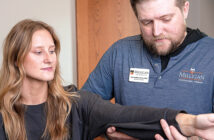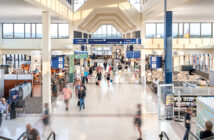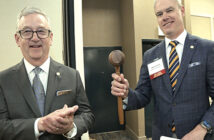Photo above: (L-R) Kayla Carter, Emily Mayo, Katie Dunn, Idalina Walker and Jenny Brock in front of a mountain bike jump near Bentonville.

Walton Family Foundation Program Officer Gary Vernon shows local officials around the Coler Mountain Preserve bike trail.
By Scott Robertson
The idea that outdoor recreation can be a beneficial tool for economic development, especially in rural areas, is not new. For the last few years, young professionals have been making decisions about where to live and work based more and more on the recreational amenities offered in any given market. So it was not surprising that when the International Mountain Bicycling Association held its Trail Labs session in Bentonville, Ark., last month, economic development entities from both Northeast Tennessee and Southwest Virginia were in attendance.
Why go to Bentonville?
Bentonville is home to the world headquarters of Walmart, which needs young professionals, and must compete with companies in much larger markets for them. Because Walmart and the Walton Family Foundation realized the drawing power of outdoor recreation, there may be no better place in America to display outdoor recreation’s potential economic relevance.
In the region stretching from Fayetteville a few miles to the south and the Missouri border a few miles north, more than 150 miles of trails have been built in the last few years. According to an InfrastructureUSA study released in April,
•
Bicycling in Northwest Arkansas provides $137 million in benefits to the economy annually.
•
Bike tourism is a significant economic driver with tourists spending $27 million at local businesses each year.
•
Investment in soft-surface mountain bike trails is a key driver of tourism with at least 55% of mountain bikers traveling to Northwest Arkansas from outside the region.
•
Bicycling in Northwest Arkansas generates $85 million annually in health-related benefits.
•
Residents of Northwest Arkansas spend more than $20 million on bicycling annually.
•
Houses within .25 miles of the Razorback Greenway sell for an average of nearly $15,000 more than those two miles from the trail.

Brock and Carter at the International Mountain Bicycling Association Trail Labs.
“It’s an economic driver,” said Bentonville Parks & Recreation Director David Wright. “It benefits people who own businesses, and not just businesses directly related to this. The development community now wants to build along the trail system.”
Kaline Griffith, president and CEO of Visit Bentonville, added, “We have 33 people a day moving into Northwest Arkansas. The median age is 31.8.” Outdoor recreation is allowing companies in a small town to compete for employees with Austin and Denver.
Gary Brumit, principal of Active Strategies, a company whose website says it makes “active lifestyle development a catalyst for growth and quality of life improvements in your community,” spoke to the potential economic impact, saying, “Everybody wants to bring in a Toyota factory. Outdoor recreation is a Toyota factory. We just didn’t know it.”
Take-aways
With Johnson City, Tenn.’s Tannery Knobs Mountain Biking Park about to open and other mountain bike trails being considered on Buffalo Mountain, as well as in Carter and Unicoi counties, Johnson City Vice Mayor Jenny Brock, Northeast Tennessee Regional Economic Partnership Outdoor Development Manager Kayla Carter and mountain bikers Marc Upton and Nathan Cole were eager to maximize the existing investment while considering next moves.
“As I look at our infrastructure investments today, I am keenly aware that my generation will enjoy them for a while, but the real benefactors are future generations. I ask this question, ‘what will it take to get young people to make Johnson City and the region their home to live, work and play?’” Brock said. “The demographic mix of our area is showing many of these young people are going elsewhere, mainly the large urban centers. I believe easy access to outdoor recreation can be a feature of our community that may attract them to stay or to come.
“Our major businesses are appealing to us to help with maintaining a strong workforce,” Brock said. “For our region to remain economically robust, we must grow. To grow, we need to attract younger people to move here. They want certain things. I think we have all those things right here. A well thought out trail system for both traditional biking and mountain biking is a feature a city/region can provide that can be one of the factors in workforce recruitment and retention. Tourists adding to our tax base is icing on the cake.”
The impact of an increase in demand for outdoor recreation opportunities in the region is already being felt, Carter said, especially among young professionals. “They want to be able to quickly access the trails or rivers after work and on the weekends. Mountain biking in Northeast Tennessee serves as a great example of how to engage with young talent as well as families. It’s also boosting our economy through bike sales, maintenance and event curation. Mountain biking is on the rise in our region. It’s already contributing to an increase in the quality of life here.”
Idalina Walker and Emily Mayo, tourism and recreation development specialists for Friends of Southwest Virginia, were joined at the event by Katie Dunn of the Norton, Va., city manager’s office. While the plethora of information on building safe, sustainable trails for mountain bikes was good, what struck Walker was, “the development strategies shared are not limited to mountain biking, but can be adapted to develop diverse outdoor recreation opportunity’s across Southwest Virginia.
Carter agreed, saying, “It’s clear that there’s going to be a return on our investment by making moves toward enhancing and creating opportunities for people to experience our natural capital in a variety of ways. It’s important for me to mention that mountain biking is just one user group that we hope to engage in our outdoor development efforts. We want to support efforts to develop opportunities, including but not limited to, hiking, paddling, fly fishing, climbing, hunting, horseback riding, off-roading as they are all equally as important to the outdoor recreation economy in our region. They all work together to provide an experience-based economy. But, we must all work together to enhance and create sustainable ways to leverage those recreation opportunities.”




